INTERVIEW: FIRE & DUST MEETS TOM SASTRY
Concrete says
any shape you can dream.
The streets say damp, rubble
rat, wind, rack-rent and fist.
The best view from here is of the future
a sky in a frame on the wall
morning blue or neon-bright
full of pleasuredomes and expressways.
The apartment has doors you can close at will.
Enough space for your thoughts
an inside toilet. A life
without layers: just thin fabric
between you and the room. There is even
hot water. England says yes
breathes in the dust that was a ceiling rose
rescues fireplaces for the suburbs
growls, from the new artery
at the sober dawn of its promise
stained, broken, lonely
its own brief surrender to hope.
________________________________–‘A popular history of urban planning’
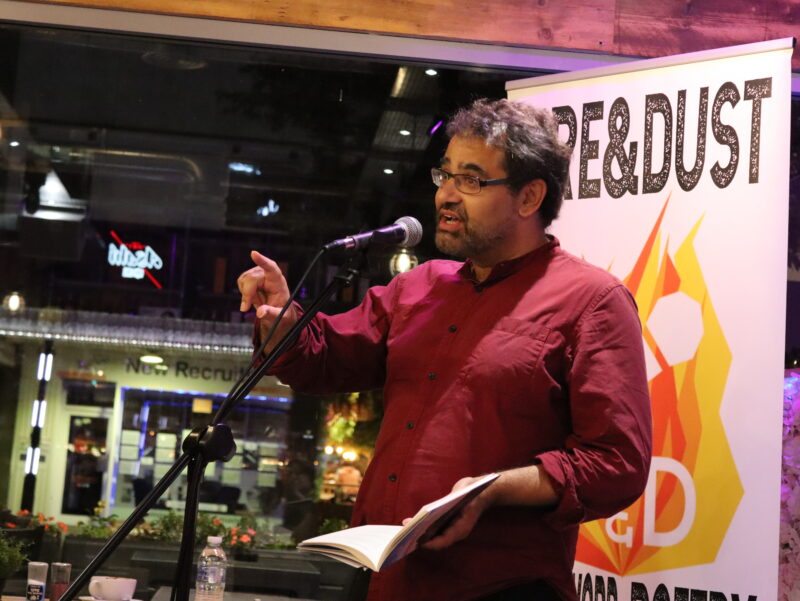
Poet Tom Sastry grew up in Buckinghamshire and has lived in Bristol since 1999. After being chosen by Carol Ann Duffy as one of the 2016 Laureate’s Choice poets, his debut pamphlet Complicity (2016) was a Poetry School Book of the Year and a Poetry Book Society pamphlet choice. Since then, he has published two collections, both with Nine Arches Press: A Man’s House Catches Fire in 2019, which was highly commended in the Forward Prize and shortlisted for the Seamus Heaney First Collection Prize, and his new book, You have no normal country to return to, which came out this year. Tom has been described by Hera Lindsay Bird as “a magician of deadpan” and praised by Carol Ann Duffy for how he “navigates the mysterious everyday…making friendships and love affairs new and strange”.
Tom was our headliner for Fire & Dust on 4th August 2022. We caught up with him after the gig, to ask a few questions…
HCE: Tell us a little about your background and journey as a writer so far. What inspired you to start creating and performing poetry, particularly in 2012 after taking a long break from it?
TS: It wasn’t really a break. I wrote poetry as a teenager. I thought I was Shakespeare but you can guess the truth: I was shit. When I began to realise it was mortifying, so I gave up, having never written anything I can bear to remember. When I started writing in 2012, I was starting from scratch.
Why did I start? I was attending open mic nights as a singer-songwriter. I gave poetry a go because it looked like fun. I enjoyed performance as a poet in a way I never had as a musician. That’s what hooked me.
HCE: Your two recent books tackle quite different topics, but would you say there are themes or motifs that you tend to gravitate to in your writing overall?
TS: A Man’s House Catches Fire was a book about processing a trauma you cannot name or perhaps even recognise. In 2013-19 when the poems were written, it seemed to me there was a lot of poetry performance based on the idea that disclosure equals redemption – a person tells their story, realises they are not alone and this is a pivotal healing moment.
That model is very flattering to an audience because it makes the audience itself central to the process of recovery. I think it created problems for some performers who felt pressure to continue exposing themselves on stage in order to give audiences that role. So I wanted to write a book about a lonelier experience of psychological trauma. In the book, there is no redemptive moment of recognition and no attempt to gain control over what has happened by naming and describing it. You don’t even find out what has happened to distress my protagonists. Everything is private and all that is observable is the effect on the psyche.
It has a middle section in which the anxiety that permeates the book is directed towards events happening in the wider world. That connects it to You have no normal country to return to, which is a book about the way public events of the kind we see on the news affect us psychologically. You have no normal country is about coping (or not) with the avalanche of bad news and hostile rhetoric which surrounds us every day. It’s also, because of the time it was written (2018-22), a snapshot of a society as it unravels.
There are a few poems in each book which are perhaps a better fit for the other. But I quite like the way the minor theme in one book becomes the main theme in the next.
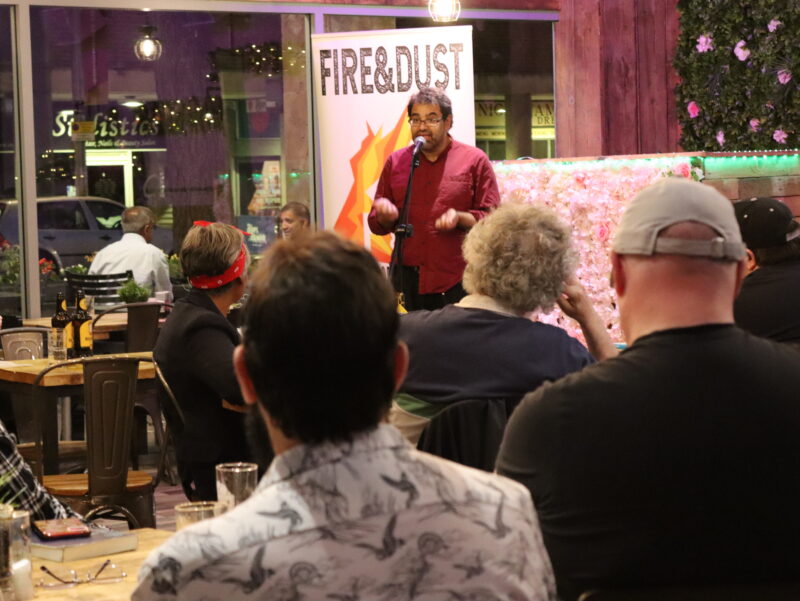
HCE: Who is your work aimed at – do you have an ideal audience in mind when you’re putting a poem together?
TS: I don’t. That doesn’t mean I’m not influenced by audience reaction: applause feels good, the opposite feels bad and it’s natural to take some notice of that. But I don’t consciously aim my work at a kind of person I imagine in my head.
I do take care not to present work which makes the audience a weapon against the kind of person the piece is attacking. I was once in the audience when a well-known spoken word poet did a long piece saying, essentially, that if someone wants an apology they are entitled to one. The piece was designed to incite a vocal reaction. Everyone has at some time deserved an apology they never received, so it worked. There was a lot of emotion in the room.
But I sat there thinking how that must feel to someone who is being continually pressured to apologise when they have done nothing wrong. I thought: this work is lazy, dangerous and overly generic; it can as easily be a weapon in the hands of a bully as something liberating. My problem wasn’t really with the messages coming from the stage. It was the deliberate use of the audience to amplify them. It felt unsafe.
HCE: Your Fire & Dust set was well-received, although of course we were disappointed that Olive the stunt leopard couldn’t be with us (!) It’s impressive that you have multiple poems from the book memorised – is this something you had to rehearse, or has it evolved naturally through working on your collection and giving readings for a while?
TS: I don’t know that it’s impressive. I learn by reciting out loud until the poem becomes an earworm and each line follows the next automatically, like when you sing a familiar song. When I am really confident in my memory (which is not always) it enhances my ability to connect with an audience.
I am dyspraxic. I struggle with balance and with remaining aware of objects in my vicinity, so not having a book gives me fewer physical things to worry about. I don’t need to find my place again after doing a passage from memory. I can devote arms to their real task – making sure I don’t fall over. And I can focus on one crucial distance (that between my mouth and the mic) without having to worry about another (that between my eye and the book). For me, memorising has big benefits.
But there’s a price. I sometimes go dry on stage, which is horrible. It also means my repertoire is limited: I could become practised in performing maybe thirty poems from the book in the time it takes to become competent doing ten off-book. So memorising is a good thing but it comes at the cost of not being able to do other good things. It may not be the right choice for everyone; and some will find it easier than others.
HCE: What messages(s) or reflection(s) do you hope readers take away from You have no normal country to return to?
TS: The book is full of poems which take the side of an individual who refuses to see themselves in a story told by other people. That is no accident. The book, for me, is partly about the refusal to accept other people’s storytelling.
The spirit of the book is one of resistance, specifically, to categorisation. In attempting to describe it in a few words, you place yourself on the wrong side of its ethic. I felt this problem keenly when I was trying to write promotional copy. I don’t like any of the words I have written to describe the book.
HCE: Do you enjoy the process of putting together a collection? Was this one easier or more difficult than A Man’s House Catches Fire?
TS: Yes. I love it. But I am sceptical about the longevity of collections. If you go to a bookshop with a good poetry section you won’t find many collections more than a few years old. Eminent poets will be represented by selected and collected editions. Even for active poets, it is rare to find readers (not reviewers) who have read the collection in order and thought about its arrangement. So, the work we put into arranging our collections is for private satisfaction. I do it because it pleases me.
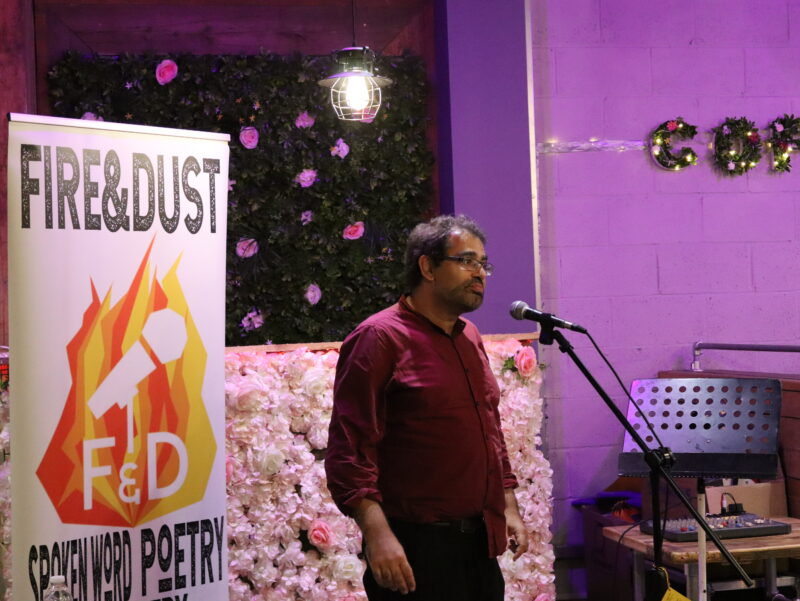
HCE: Have you always had a fascination with the world ending, or is there something about recent times that has led to using this as a framework in several of your poems?
TS: If you find the end of the world boring, there’s no hope.
HCE: Although often dark, there is a lot of humour in your work and also in how you present it for audiences. Do you think humour is an essential device in poetry, for appealing to and connecting with people?
TS: I think my poetry – like anyone’s – is a mix of elements; and I think some of those elements have to engage an audience while others challenge it. Humour is what I use to engage. It allows me to sustain a questioning viewpoint and an interest in ideas without becoming a bore (I hope). I need it because I believe in writing into the difficulty: I would rather write about the thing which divides me from my best friend than the thing all my friends agree on. Humour buys me permission to be complex and sometimes miserable. It is not the only way of attending to the needs of an audience but it is the one which comes most naturally to me.
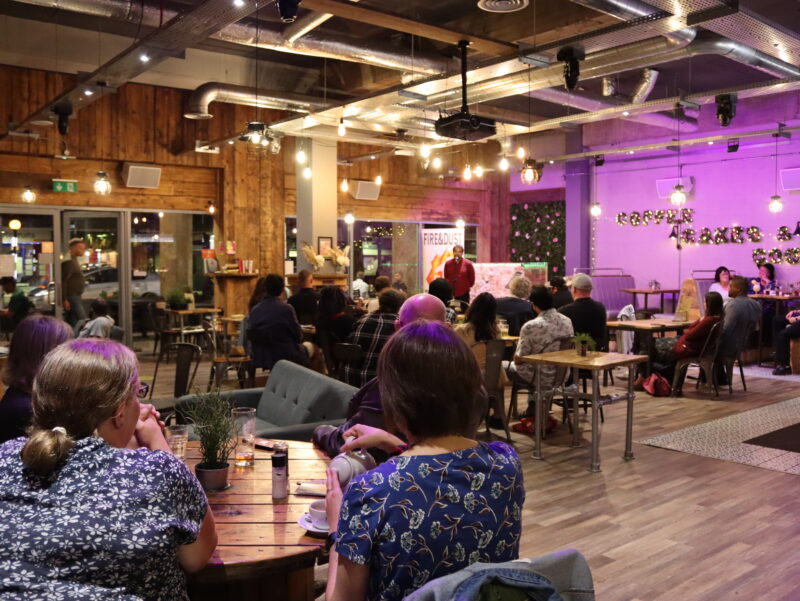
HCE: In your experience, is Bristol a good place to be a poet? Does the city have a thriving literary scene, and would you say it nurtures established and developing writers equally?
TS: I think it is good to be proud of your own city and enthusiastic about the talent there. I love Bristol and I am very grateful to all those who help poetry happen there. I have made many friends through poetry in Bristol and I think that is what has kept me going.
HCE: What type of poetry do you seek out for personal enjoyment? As a reader/listener, when you engage with a poet’s work, what are you hoping to get out of it? (Feel free to namedrop some collections/performers who have made an impression on you!)
TS: I am extremely proud to be published by Nine Arches because there is no publisher whose output I enjoy so consistently.
Beyond that, I have no idea. And I think that’s good. I hope never to have a personal manifesto which causes me to reject poetry because it doesn’t fit my ideals.
I do have a slightly curmudgeonly idea about where British poetry is right now. I think new writers notice what kind of work gets a lot of attention and feel pressure to imitate it. At the moment the pressure is to produce work which offers, essentially, a British creative writing school synthesis of recent trends in American poetry.
Introducing students to work from the US which is not yet widely read here is a simple way for writing programmes to add value. But it has a side effect. By creating a kind of insider poetics for trained writers, it differentiates professionally trained or mentored poets from poets emerging from the various grassroots scenes – re-establishing a demarcation which the revival in poetry performance had begun to blur. I don’t think that’s particularly healthy.
I think these things are cyclical. We have had a few years of looking across the Atlantic for new ideas of what poetry can be, and a shift is probably overdue. But I hope that doesn’t just lead to a new set of imported modes becoming the mark of sophistication. We need to be open to new influences without devaluing work which does not show those influences. That’s easy to say but it’s hard to sustain a taste broad enough to make it a reality.
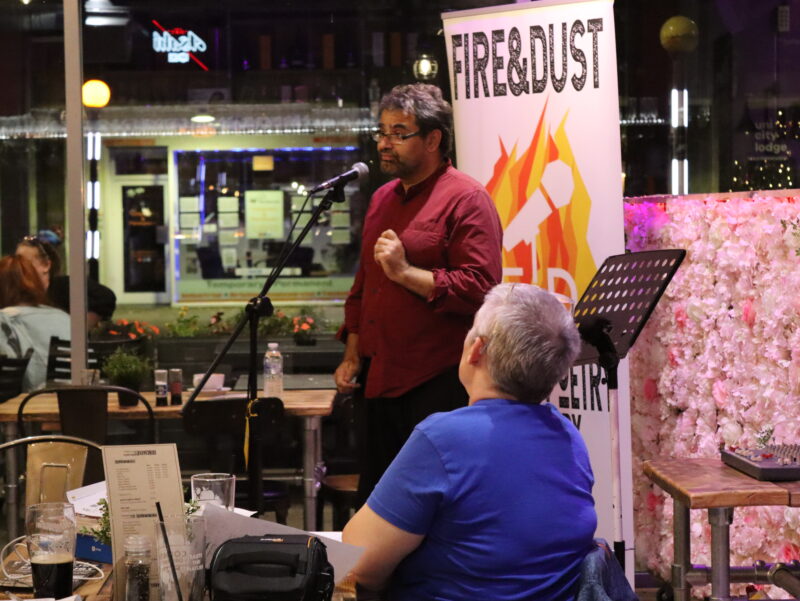
HCE: Your work has been described as taking a “refreshingly nuanced and questioning approach” to commonly explored topics, such as ‘identity’. What would your top piece of advice be for poets who are struggling with how to explore universal themes from an original perspective?
TS: Find people who like and trust you in your poetry community. This is absolutely the most important thing. Because if you really make use of your own singular perspective, you will end up saying things you expect your friends – not just your enemies – to disagree with. You are choosing to make your way with less encouragement than you might otherwise get.
Most poetry audiences lean to the left politically and love to feel that they – the noble few in the room – are right, and the others outside the room are wrong. If, like me, your politics are also on the left, this creates a strange situation where things you would need to be very brave to say in other places become the safe, crowd-pleasing thing to say from a poetry stage.
That gives you a real freedom to attack the powerful and speak from a marginalised perspective; but it also creates a pressure to do so in a predictable way which instantly reassures the audience that you are one of them. The secret is to embrace the freedom without succumbing to the pressure. But make sure you have those friends who really get you, otherwise it can be a bit scary.
What do I mean by scary? I don’t mean that writers get cancelled by leftwing twitter mobs for stepping a millimetre out of line. That’s a ridiculous caricature of the reality. But we are all human and therefore hypersensitive to anything which threatens our standing with our friends. In the age of social media, mild criticism can create existential dread. We could be more honest about this situation rather than pretending either that people who criticise are out to destroy us, or that the fears most of us experience on social media aren’t real.
HCE: What’s next on the horizon for you? Are you already working on projects/booked for upcoming performances?
TS: A rest! A new book with the gigging and other related work that comes with it, turns me from someone who goes to open mics and writes in his spare time to someone with two jobs. I can just about sustain that for a few months. But I need to ease off soon.
HCE: What’s the best way for people to keep connected with you and your work, or contact you for bookings?
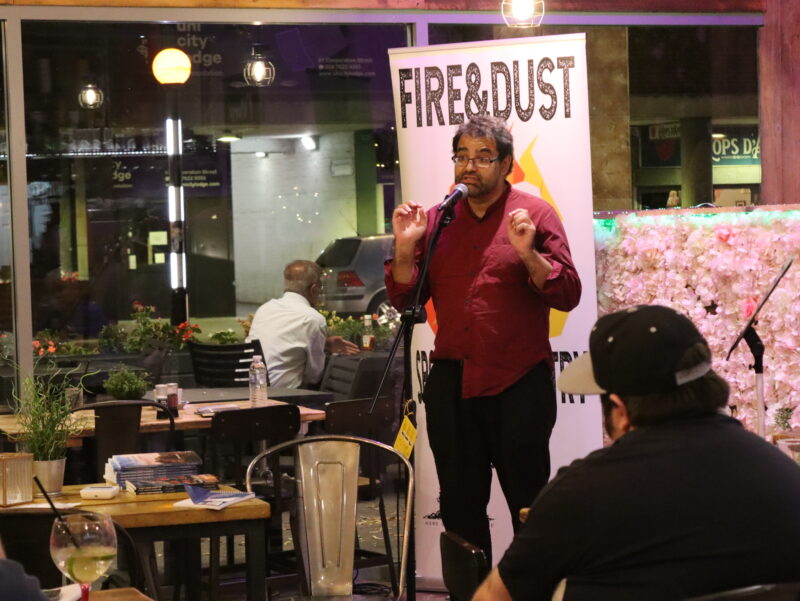
HCE: Is there anything we didn’t cover that you’d like to share with our readers?
TS: Thanks for having me!
Tom’s books can be purchased online from Nine Arches Press.
